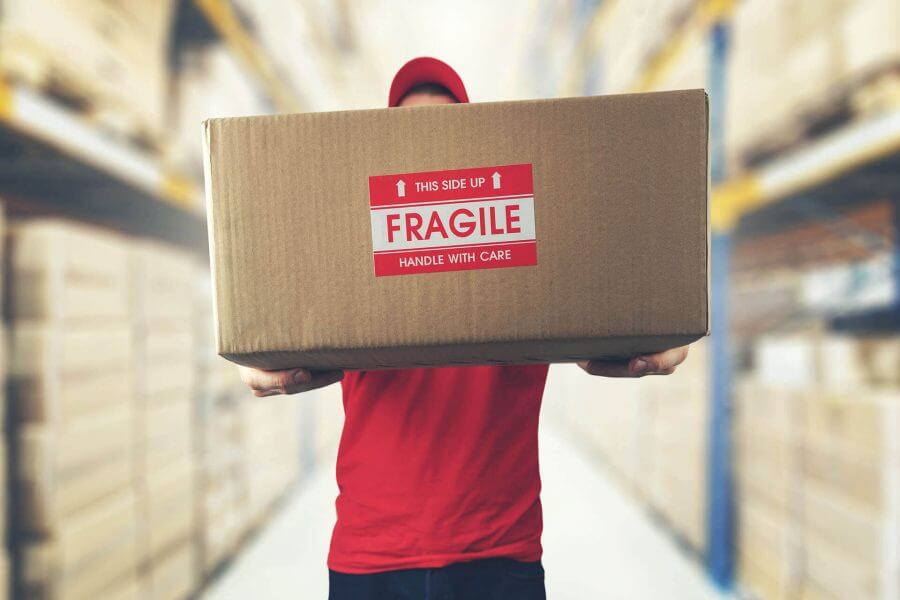

How to Prepare for a Move Like a Pro?
Posted in How-to,Planning the Move on October 28, 2022
If you are in the process of planning a move, you’re likely feeling a range of emotions – excitement, anticipation, and maybe even a little bit of anxiety. Knowing how to tackle this process from the start can help you reduce the stress – but how to prepare for a move in the best way possible? All you have to do is follow our simple guide and start getting ready for your big day.
First of all, you need to create a detailed plan and timeline. This includes setting aside time for creating a budget, decluttering, organizing, and packing. Having a well-thought-out plan can lead to a smoother and more successful relocation experience. But what should this plan contain? Hiring movers, transferring utilities, updating your personal data, and preparing your home for the relocation day – those are all essential parts of the relocation day preparations.
How to Prepare for a Move – For Starters, Get Organized
There are a lot of things to think about when you’re planning a move to another city. You need to decide where to live, how to get to your new location, and what to do with all of your stuff. It can be a lot to handle, which is why it’s so important to get organized before you start packing up your life. Here are some tips for what you should do at the start of your cross-country moving journey:
Create moving and packing binders
Relocation binders can help you keep track of everything from your important documents to your packing list. This way, you’ll have a place to keep your relocation to-do list, organize your schedule, make timetables, and hold all your move-related paperwork.
Go around the house and take inventory
Making a household inventory list helps you make sure nothing gets lost in the move, and it will also give you an opportunity to get rid of anything you don’t need or want anymore. Additionally, if you plan on taking moving insurance, relocation inventory will provide you with additional security.
Crunch numbers and create a relocation budget
Make a list of all the expenses you anticipate during your move, including the cost of hiring cross-country movers or renting a truck, additional services you may need, trip expenses, and so on. Keep in mind our experienced Cross-Coutnry Movers have professional services for enjoying stress-free relocation. Compare these costs with the money you have at your disposal, and adjust your needs to the realistic relocation budget. If possible, set aside some money each month so that you’ll have enough saved up to cover your expenses when the time comes.
Getting organized also means making a relocating-to-another-state checklist of all the things you need to do before, during, and after the move. Once you have your list of tasks, it’s time to create a timeline. When do you need to change your address, cancel your utilities or start packing? When you plan to move to a new state, putting everything in writing will help you stay on track and make sure nothing gets forgotten.
Packing Like a Pro Will Make Relocation Easy
If you decide against getting professional packing services, all the boxing up and heavy lifting will be on you. It’s one of the most challenging long-distance moving tasks you need to handle. Additionally, in order for your belongings to arrive at your new destination undamaged, you need to do it with the utmost care.
However, before you start putting your belongings in boxes, don’t forget about the essential pre-packing step – decluttering. Purging through your home can save time, money, and energy. It allows you to more accurately assess the packing materials and space needed for your belongings and ensures that you are only bringing items that truly bring value or joy to your new home.
Not only that it can help you save on relocation costs (fewer belongings means lower transportation costs), but decluttering can potentially lead to extra income through selling unwanted items or donating them to those in need. Overall, deciding what to keep when relocating and what to leave behind can really help you move efficiently and make relocation a more enjoyable experience.

Get All the Necessary Supplies When Preparing to Move
The first – and arguably most important – thing you’ll need for your move is boxes. If you don’t want to buy new ones, note that you can usually find these for free on websites such as Freecycle or at your local grocery or liquor store – just be sure that they are sturdy enough to withstand a bit of wear and tear.
Next on the list is padding and cushioning material. This will help keep your fragile items safe during transit and prevent them from breaking or shattering. To save money, you can use old towels, blankets, and clothes as padding for belongings that don’t need the additional protection bubble wrap and packing paper provide.
In addition to the above items, there are a few other miscellaneous supplies you might need for your move. These include:
- Tape – for sealing up boxes,
- Sharpie – for labeling,
- Scissors – for cutting tape and bubble wrap,
- A dolly – for relocating furniture and appliances,
- Furniture pads – for protecting your furniture from scratches,
- A toolkit – for disassembling furniture (if necessary),
- Trash bags – for collecting trash during the packing process.
How to Get Ready to Move – Figure Out the Way to Pack up Fragile and Delicate Items
Bubble wrap and padding materials are a must when you start packing fragile items. Begin by padding the bottom of the box with your chosen materials – this will provide a cushion for your delicate items and prevent them from breaking. Next, take each item and wrap it individually in bubble wrap or another protective material. After each item is wrapped, place it carefully in the box.
Make sure that heavy items are placed at the bottom of the box and lighter items are placed on top. You may want to use crumpled-up paper to fill any empty space in the box so that your items don’t shift during transit. Once all of your items are safely packed away, be sure to label the box clearly with the words “Fragile” or “Delicate.” This will ensure that your movers handle the box with care.

One Step of Moving Preparation Is Having a Packing Order
For a more organized packing process, make sure to pack your belongings in phases, not tackle all of them at once. First, start packing up garage items or, for example, off-season clothes and other things you don’t currently use. On the other hand, leave relocation essentials (toiletries, medicine, electronics, and so on) for last since you’ll be using them until the day of your move. Label them correctly, and make sure they don’t leave your side during the move – you’ll need them as soon as you arrive at your new home.

Hire Long-Distance Movers to Help You With All the Tasks
Hiring relocation experts can be expensive, and it’s possible to complete a long-distance move without professional help. However, there are several compelling reasons to consider hiring professionals to assist with your upcoming relocation.
The first and perhaps most obvious benefit of hiring long-distance movers is that they will take care of all the heavy lifting for you. Rather than struggling to lift and carry heavy items on your own, you can simply leave the job to the professionals.
On the other hand, movers have a lot more knowledge about the relocation process, even if you’re not relocating for the first time. When you move by yourself, there’s always the risk that something could get damaged in transit due to improper packing or loading. However, when you hire professionals, they will know how to properly pack and load your belongings so that they arrive at your new home in one piece.
Finally, getting cross-country moving services can help you achieve a stress-free relocation. Moving cross-country is notoriously stressful, but it can be even more so when you’re trying to do everything yourself. When you hire a relocation team, you can rest assured knowing that someone else is taking care of the details for you. This can free up your time and energy so that you can focus on other important things during your move.
Use a Variety of Services When Moving Across the Country
Uprooting your whole life and relocating to a new city is a lot of work. It’s no wonder that people dread it so much! If you’re in the process of planning a move, though, note that some relocation companies can offer you plenty of useful additional services that can make your move easier.
Besides packing services, many reliable teams can provide you with professional car shipping – if you don’t wish to dive all the way across the country. They can also offer you pretty affordable storage services if you want a place to store your belongings until you settle. Therefore, if you have a place in your budget, getting as many additional services as possible is always advisable.
Before Moving Cross Country, Get Your Documents in Order
Among all of the boxes to pack and goodbyes to say, it’s important to make sure that you have all of your documents in order, especially important paperwork such as certificates, medical and school records, tax returns, contracts, and bank statements. At the same time, make sure those papers become reminders of all the subjects you need to notify about the move.
How to Prepare for Moving – Get Other Important Details in Order
At least two weeks before you move, you should forward your mail, so you can get it immediately after settling in. While you’re at it, make sure your driver’s license is up to date and ensure that you update your voter registration data. Tasks like canceling or transferring utilities or canceling memberships should also find their way to your to-do list.

Prepare Your Home for Movers
Before movers arrive, it is important to have all of your belongings packed and ready to go. This includes properly labeling boxes and creating a clear plan for where items should be placed in the new home. Additionally, it is helpful to clearly communicate any special instructions or concerns with the movers and have a reserved and accessible parking spot for the relocation truck.
If you plan to relocate a lot of heavy furniture and boxes, know that they can be tough on your floors and furniture. To protect them from damage, be sure to cover them with blankets or plastic sheeting before the movers arrive. This will help prevent scratches, scuffs, and other damage during the move.
At the same time, make sure you clear a path from your front door to the truck so that the movers can easily get your belongings out of your home. Once experts are done with the work, make sure you have enough cash to tip movers – if you’re satisfied with the service, of course.
Get Ready for a Quick Move-Out Cleaning
If you’re moving out of a rental property or simply wish to sell your house, you’ll likely need to do a deep clean before you hand over the keys. Most landlords require tenants to leave the property in the same condition as when they moved in. On the other, you also need your old house to look its best once possible buyers come to see it. Take a look at the video below for some valuable tips on how to clean your home fast and efficiently:
After Proper Preparation, Enjoy the Moving Day
After all your preparation, the day has finally arrived! It’s time to sit back and enjoy the fruits of your labor. This is an exciting new chapter in your life, and it’s going to be great. All that is left is to do a final walkthrough of your old home. Double-check that everything is packed up and ready to go – you don’t want to leave anything behind. Finally, say goodbye to your old home and get ready for the next adventure.
Contact us for the best relocation quote out there and ensure your move goes as smoothly as possible. Our professional relocation crew will make sure every little detail regarding your move is accordingly planned and nothing’s left to chance.
Frequently Asked Questions About How to Prepare for a Move
What are the key steps to prepare for a move?
The key steps to prepare for a move include: creating an inventory of your belongings; hiring the right moving company or rental truck service, packing up items in a logical way, and gathering all the necessary documents for the move. Additionally, you should also consider creating a budget for your move and researching what resources and services will be available at your new home
How should I start planning for a move?
The best place to start is by creating a detailed timeline and checklist. Make sure you create both a short-term and long-term plan, including tasks such as researching potential movers or storage facilities, sorting through your possessions, notifying utility companies and landlords of your move date, and preparing any necessary paperwork.
What items should I prioritize when packing for a move?
When packing for a move, it is important to prioritize your items. The most essential items you should pack are those that are necessary for day-to-day living and cannot be replaced easily. This includes toiletries, medications, electronics, clothing, bedding, and kitchen supplies.
How can I stay organized during the move?
Staying organized during a move can be challenging. However, there are some things you can do to make the process easier. First and foremost, create an inventory list of all items that will be moved including those being packed in boxes and furniture pieces. This will help you keep track of what is where ensuring nothing gets lost or forgotten along the way.
Additionally, consider using color-coded labels for boxes for easier sorting. Finally, enlist help from family and friends to assist with packing and unpacking as it will make the process significantly faster.
What are some ways to simplify packing for a move?
Simplifying the packing process for a move can help reduce stress and make the transition smoother. Here are some tips for making packing easier:
- Start early – Start packing well in advance of your move so that you have time to organize and declutter.
- Declutter – Get rid of items you no longer need or use before you start packing. This will simplify the packing process and make it easier to stay organized.
- Label boxes – Clearly label each box with its contents and the room it belongs in. This will make it easier to unpack and keep track of your belongings.
How can I make sure my belongings are protected during a move?
Protecting your belongings is an inevitable step in the relocation process. So, ensure you use high-quality boxes and wrap items carefully. Cover furniture with furniture pads or blankets, but make sure the larger objects like bed frames, desks, and shelves are disassembled first.
How should I choose a reputable moving company?
Read online reviews and ask friends or family if they have used any particular companies in the past. Make sure you get quotes from several different companies so that you can compare prices, services, and reputation. Find out what kind of insurance coverage is offered by each company, and make sure they are properly licensed and insured.
What are some tips for making the moving process easier and less stressful?
Relocating can be a stressful and overwhelming process, but if you plan it ahead, get organized, and hire a professional cross-country mover, you’ll make it easier.
How can I minimize the disruption to my daily routine during a move?
One of the best ways not to disrupt your daily routine is to stay organized and take care of yourself. that way, you’ll keep your usual sleep schedule and continue to exercise as much as possible.
How can I get help from friends and family for a move?
Getting help from friends and family during a move can be a great way to make the process easier and less stressful. So, ensure you ask for help early and give your loved ones plenty of notice so they can plan accordingly. Also, give each person a specific task and don’t risk confusing them.




